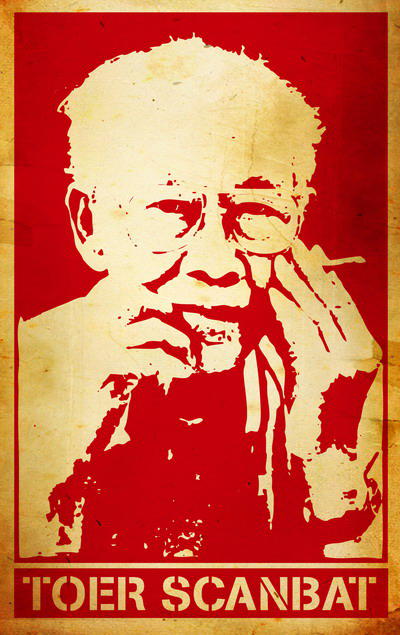Toer
TrueTypeShareware
Toer.ttf
Tagi
Uwaga autora
Toer is Scanbats of potrait Pramudya Ananta Toer. Pramudya Ananta Toer was an Indonesian author of novels, short stories, essays, polemic and histories of his homeland and its people. His works span the colonial period, Indonesia's struggle for independence, its occupation by Japan during the Second World War, as well as the post-colonial authoritarian regimes of Sukarno and Suharto, and are infused with personal and national history. The Dutch Government imprisoned him from 1947 to 1949.
Pramoedya's writings sometimes fell out of favor with the colonial and later the authoritarian native governments in power. Pramoedya faced censorship in Indonesia during the pre-reformation era despite the fact that he was well known outside Indonesia. The Dutch imprisoned him from 1947 to 1949 during the War of Independence (1945-1949). During the changeover (coup) to the Suharto regime Pramoedya was caught up in the shifting tides of political change and power struggles in Indonesia. Suharto had him imprisoned from 1969 to 1979 on the Molukken island of Buru and branded him a Communist. He was seen as a holdover from the previous regime (even though he had struggled with the former regime (Sukarno). It was on the Island of Buru that he composed his most famous work, the Buru Quartet. Not permitted access to writing materials, he recited the story orally to other prisoners before it was written down and smuggled out. Pramoedya opposed some policies of founding President Sukarno as well as the New Order regime of Suharto, Sukarno's successor. Political criticisms were often subtle in his writing, although he was outspoken against colonialism, racism and corruption of the Indonesian new Government. During the many years in which he suffered imprisonment and house arrest (in Jakarta after his imprisonment on Buru), he became a cause clbre for advocates of human rights and freedom of expression.
Pramoedya's writings sometimes fell out of favor with the colonial and later the authoritarian native governments in power. Pramoedya faced censorship in Indonesia during the pre-reformation era despite the fact that he was well known outside Indonesia. The Dutch imprisoned him from 1947 to 1949 during the War of Independence (1945-1949). During the changeover (coup) to the Suharto regime Pramoedya was caught up in the shifting tides of political change and power struggles in Indonesia. Suharto had him imprisoned from 1969 to 1979 on the Molukken island of Buru and branded him a Communist. He was seen as a holdover from the previous regime (even though he had struggled with the former regime (Sukarno). It was on the Island of Buru that he composed his most famous work, the Buru Quartet. Not permitted access to writing materials, he recited the story orally to other prisoners before it was written down and smuggled out. Pramoedya opposed some policies of founding President Sukarno as well as the New Order regime of Suharto, Sukarno's successor. Political criticisms were often subtle in his writing, although he was outspoken against colonialism, racism and corruption of the Indonesian new Government. During the many years in which he suffered imprisonment and house arrest (in Jakarta after his imprisonment on Buru), he became a cause clbre for advocates of human rights and freedom of expression.
Mapa znaków
Proszę korzystać z menu rozwijalnego aby podglądać różne mapy znaków zawierane do tej czcionki.

Podstawowe informacje o czcionce
Rodzina czcionki
Toer
Podrodzina czcionki
Normalny
Wyjątkowa identyfikacja podrodziny
Toer:Version 1.00
Pełna nazwa czcionki
Toer
Nazwij Wersję tabelki
Version 1.00 January 6, 2014, Blora
Postscriptowe imiona czcionki
Toer
Zawiadomienie o znaku towarowym
Pramudya Ananta Toer
Producent
Hemipiola
Projektant
Didik Pratikno
Rozszerzone informacje o czcionce
Obsługiwane platformy
PlatformaKodowanie
UnicodeUnikod 2.0 a nasledovná sémantika, tylko BMP unikod
MacintoshAntykwa (roman)
MicrosoftTylko BMP unikod
Szczegóły czcionki
Stworzony2014-01-07
Korekta1
Liczba znaków54
Jednostki po Em2048
Prawa osadzeniaOsadzania dla redagowania dozwolone
Klasa rodzinySymboliczne
GrubośćŚrednia
SzerokośćPodstawowa
Styl MacPogrubiony
KierunekTylko znaki skierowane od lewej do prawej
Natura wzoruRegularny
GęstośćNierówny
